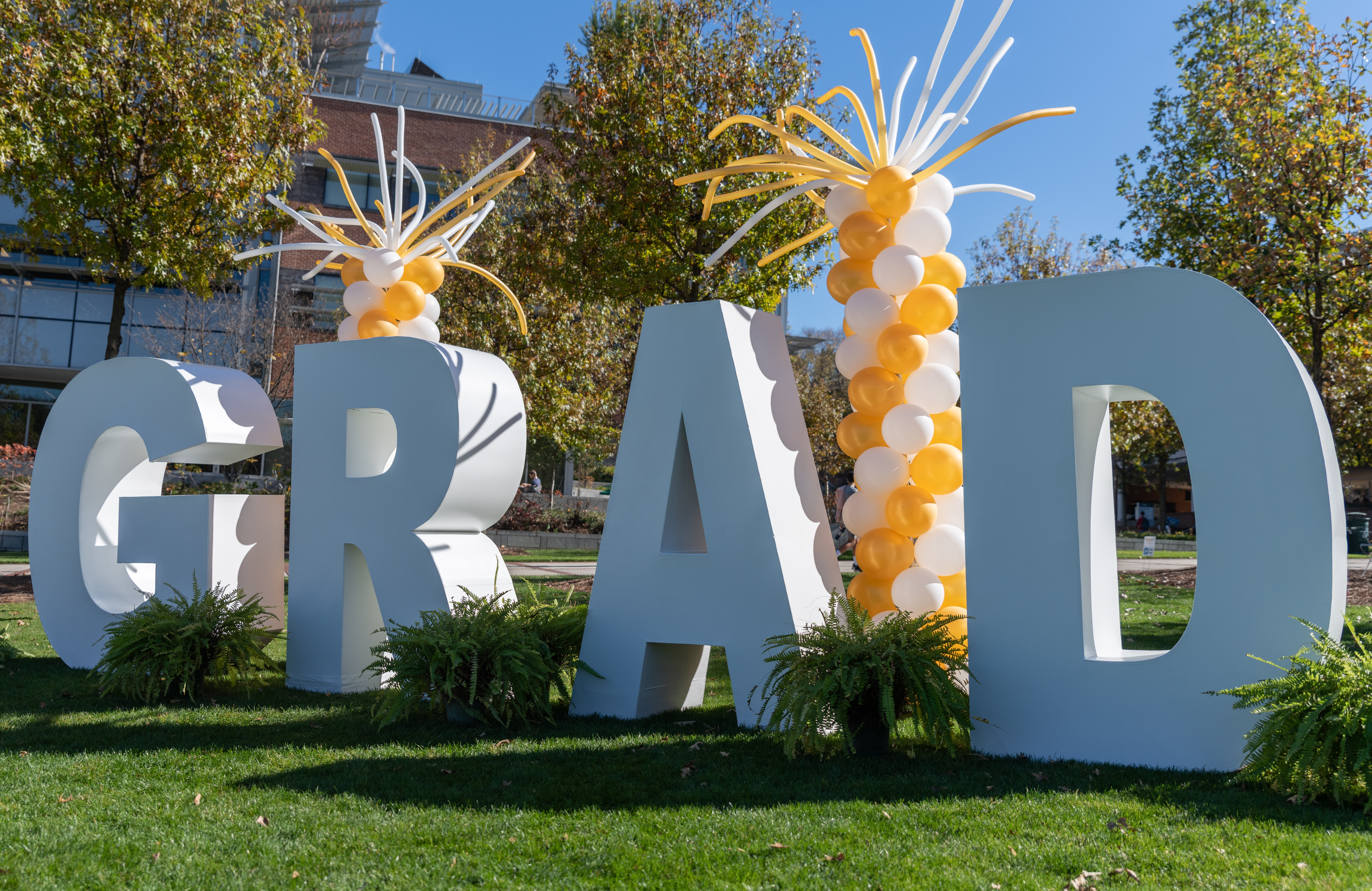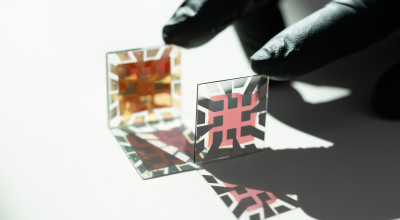
As the nonprofit applied research unit of the Georgia Institute of Technology (Georgia Tech), the Georgia Tech Research Institute (GTRI) remains strongly connected to students. Students bring vibrancy and new ideas into our organization while gaining real-life experience as they apply concepts from the classroom. GTRI continuously seeks dynamic and innovative undergraduate and graduate students for research positions as well as roles in administrative support, management, and technical support. As of March 31, 2021, GTRI engaged 368 active student employees from multiple universities.
When students’ college careers come to a close, some choose to stay with GTRI while others embark on a new life chapter equipped with knowledge and experience they gained from their time at GTRI.
The ending of the spring 2021 semester brings celebration for many of our student employees as they gather their regalia and prepare to walk across the stage to receive their hard-earned diplomas. Two GTRI graduating students, Walter (Drew) Disharoon and Laura Heller, share their experiences and wisdom.
Disharoon is graduating with his bachelor of science in electrical engineering from Kennesaw State University (KSU). Since January 2020, Disharoon has supported many projects within the Sensors and Electromagnetic Applications Laboratory (SEAL). He plans to pursue a Ph.D., also in electrical engineering, from Georgia Tech.
Heller is graduating with her master’s in electrical engineering. She completed the joint BS/MS electrical engineering program offered by Georgia Tech, which allows highly qualified students to receive a bachelor of science in electrical engineering and a master’s degree in electrical engineering within a five-year time frame. Heller works within the Electro-Optical Systems Laboratory (EOSL) and plans to pursue her Ph.D. from the University of Illinois at Urbana-Champaign (UIUC).
Q&A With Drew Disharoon and Laura Heller
How has your college experience been?
Disharoon: I went to Kennesaw State University and stuck there because I liked the faculty. Right now, I’m pursuing the electrical engineering degree, and then in the fall, I’ll start my Ph.D. over at Georgia Tech. I don’t want to say we’re a small program, but by the time you get to the junior- and senior-level classes, you pretty much know everybody else in the program. You get a really nice sense of community in the program where everyone is working together, and you know what everyone is doing and what they like.
Heller: I’m finishing my master’s in electrical engineering at Georgia Tech; I also completed my bachelor’s from there as well. I took one of the foundational electrical and computer engineering (ECE) classes and had that “awe” feeling. As I got more and more into the degree, I found the physics behind electrical engineering to be really interesting. I wanted a job that creates technology people use every day.
What projects have you gotten to work on here?
Disharoon: In the beginning, it was mostly test automation … Later in the spring, we started doing a lot of stuff with the fancy field-programmable gate arrays (FPGA) called RFSoC or Radio Frequency System-on-Chips. They’re used basically in the back-end, and they have direct RF sampling, so we can do what is called digital beamforming, which is where you steer your beam in the time domain rather than in the phase. Over the summer, I was mostly involved with helping my supervisor, Thomas Williamson, with the Undergraduate Research Internship Program (URIP) … In the fall, I did a lot more FPGA stuff where we were trying to calibrate a digital radar array. I also got to do a tiny bit of machine learning work. Most recently, it’s been a lot of EM Solver to design a few different boards [GTRI researchers] wanted for their project.
Heller: At a high level, I’ve got to work on photonic integrated circuits. I’ve gotten acquainted with simple optical tests — seeing, “Can I measure the power here?” and then kind of building up from there. Being able to see how signals change when you modulate or do something different to it and then applying that to actual tests and characterization has been really cool. For the modeling, it’s been interesting because I can play around more and immediately see what happens. There’s something about physically doing the stuff that [makes you] learn a lot more than sitting in class.
What made you decide to pursue a Ph.D. program at Georgia Tech?
Disharoon: I really like the research field where I kept getting to mess with new things over at GTRI. The second reason is I really liked the radar beamforming — fancy hardware stuff that’s really hard to get into with just a bachelor’s degree. Or you can get into it, but you’re just going to be a test engineer. I’m looking forward to getting involved in more interesting design classes where we’re really starting to mess with engineering rather than the fundamentals that get you to engineering.
How has your education at Georgia Tech and your employment at GTRI prepared you for your Ph.D. program at UIUC?
Heller: Doing the BS and MS [programs at Georgia Tech] has been really fun. Especially from being at GTRI, I’ve really enjoyed figuring out how to run and even come up with experiments. I want to dig deeper, and that was the big motivation [for pursuing my Ph.D.]. I just want to learn more, be able to challenge myself, and improve my skills for later on.
Have there been any mentors or people you’d like to acknowledge from GTRI?
Disharoon: My supervisor, Thomas Williamson, made the biggest impact on me personally. Ryan Westafer over in the Advanced Concept Laboratory (ACL) knows the answer to anything. I’m not convinced he doesn’t know anything.
Heller: Benjamin Yang has been really helpful with my onboarding. And then, as far as the actual day-to-day work, I work a lot with Leif Sandstrom. He’s also super knowledgeable, nice, and super helpful. He’s made a lot of time to help the students and deal with all of our questions. He has given us a lot of his time, and we’ve all really benefited from that and learned a lot from him because he has tons of experience and is so willing to share.
What would be your advice for students who are just starting at GTRI?
Disharoon: Don’t be afraid to ask questions. Whenever I first started, it was me and another intern who worked together a lot because we were under the same supervisor. When we first started, we were both a bit shy. You get this mentality of, “I don’t want to sound useless; I got to figure this thing out on my own.” But at GTRI, you are better off to ask a lot of questions and get to know all the other people. Once we got like three weeks in, we knew whom to ask questions when we didn’t know what we were doing.
Heller: Ask questions. You go in thinking you should know all this stuff, but [GTRI] is very much a free and open environment. The more questions you ask, the more you are going to learn.
What are your long-term goals?
Disharoon: Right now, I’m planning on probably working in industry. I’m hoping to apply to some of these big tech companies that are working in the same communication field doing a lot of the beamforming stuff. All these 5G towers are now using beamforming in their communication, and any of these defense companies like Lockheed and GTRI are going to be doing beamforming for their radars. I like the beamforming, all the FPGA stuff, and a lot of the RF stuff, so I’ll probably end up looking for an industry job somewhere in there.
Heller: Someone told me once, “Don’t plan more than five years ahead because you never know what’s in store,” which I think has been pretty good advice. My tentative goals are to be doing a research position when I get out of my Ph.D. program. Maybe for industry, or maybe I’ll come back to GTRI. I think I would want to continue my research in phonics and optoelectronics or some sort of applied solid-state physics.
What will you miss about working here?
Disharoon: My favorite thing is the company culture where you can walk up to almost anyone and say, “Hey, I don’t understand this,” and you’ll get a 45-minute explanation of how it works. I know engineers sometimes get the rap of not being very extroverted or communicative, but I think that’s just a fake thing because you walk up to any engineer, and they’ll just talk your ear off … I got to work with a bunch of really interesting people here — a lot of really smart people in a wide range of topics. I’ll miss having the wide range of resources here — you have like 16 engineers right down the hall who want to help you with stuff. I’ll also miss the flexible work schedule.
Heller: I really like the people — they are really helpful. GTRI is a place where you can get your hands dirty, and you aren’t afraid to just try something … Being able to talk to other people and bounce ideas off one another has been tremendously helpful for me and fun.
GTRI Employment Opportunities
GTRI is always looking for new talent to join our team. There are numerous opportunities for students currently pursuing undergraduate or graduate degrees in addition to full-time positions for recent graduates.
Go to GTRI Careers to start searching for a position. You can use the filters on the right side of the page to narrow your search. And if you do not see an opportunity that fits your current interests or needs, please subscribe to job alerts and join the GTRI talent pool.



